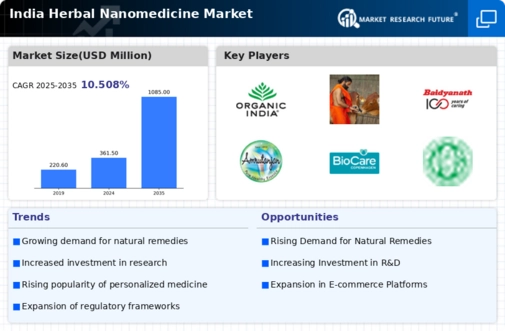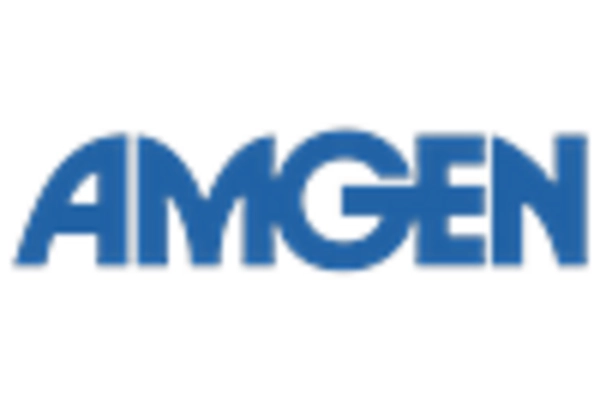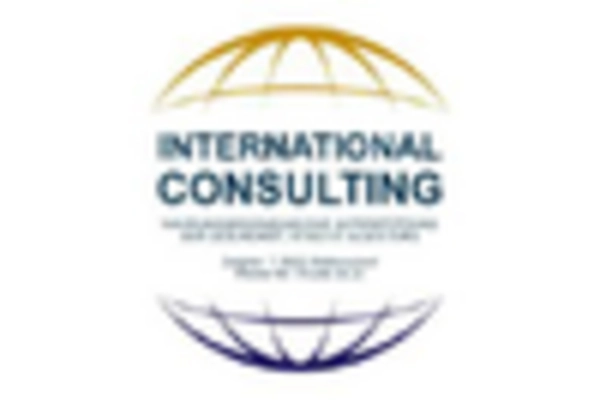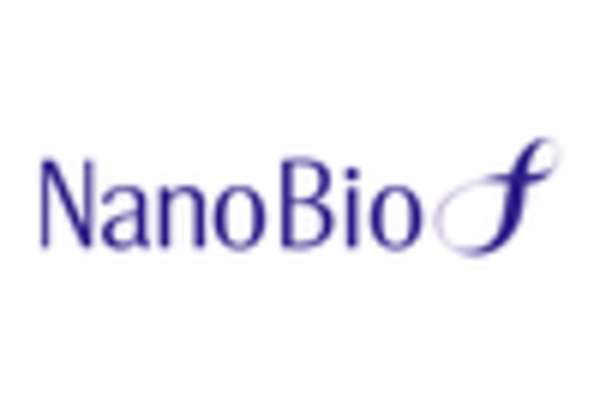Growing Consumer Awareness
There is a surge in consumer awareness regarding the benefits of natural remedies in the herbal nanomedicine market.. As individuals become more informed about the potential side effects of synthetic drugs, there is a noticeable shift towards herbal alternatives. This trend is particularly pronounced among younger demographics, who are increasingly seeking holistic health solutions. Reports indicate that the market for herbal products is projected to grow at a CAGR of 15% over the next five years. This growing awareness is likely to drive demand for herbal nanomedicine, as consumers seek effective and safe treatment options that align with their health philosophies.
Government Initiatives and Support
The Indian government is actively promoting the herbal nanomedicine market through various initiatives aimed at enhancing the production and distribution of herbal products. Programs such as the National Ayush Mission are designed to support the development of traditional medicine systems, including herbal nanomedicine. Additionally, the government has introduced policies to facilitate research and innovation in this sector, which is expected to attract both domestic and foreign investments. This supportive regulatory environment is likely to foster growth in the herbal nanomedicine market, making it an attractive area for stakeholders.
Rising Incidence of Chronic Diseases
The herbal nanomedicine market is being propelled by the rising incidence of chronic diseases in India. Conditions such as diabetes, cardiovascular diseases, and cancer are becoming increasingly prevalent, leading to a growing demand for effective treatment options. Herbal nanomedicine offers a promising avenue for addressing these health challenges, as it combines the therapeutic properties of traditional herbs with the precision of nanotechnology. Market analysis suggests that the herbal sector could capture up to 30% of the overall healthcare market by 2027, driven by the need for alternative therapies that are perceived as safer and more natural.
Cultural Acceptance of Herbal Medicine
Cultural acceptance of herbal medicine in India plays a pivotal role in the growth of the herbal nanomedicine market. Traditional practices, such as Ayurveda, have long been integrated into the healthcare system, creating a strong foundation for the acceptance of herbal products. As consumers increasingly seek natural and holistic approaches to health, the demand for herbal nanomedicine is expected to rise. Surveys indicate that over 70% of the population prefers herbal treatments for minor ailments, which suggests a robust market potential. This cultural inclination towards herbal solutions is likely to drive the expansion of the herbal nanomedicine market in the coming years.
Increased Investment in Research and Development
Investment in research and development (R&D) within the herbal nanomedicine market is on the rise in India. Pharmaceutical companies and research institutions are increasingly focusing on the development of innovative herbal formulations that utilize nanotechnology. This investment is crucial, as it not only enhances the efficacy of herbal medicines but also ensures their safety and quality. The Indian government has allocated approximately $200 million towards promoting herbal research, which is expected to yield significant advancements in the field. As a result, the herbal nanomedicine market is likely to benefit from improved product offerings and increased consumer trust.
















